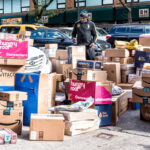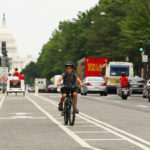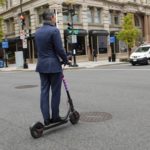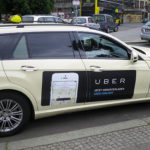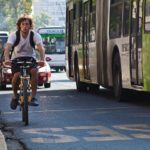Posts tagged with 'D.C.'
After two years of unprecedented disruption to transport globally and two years of virtual conferences, Transforming Transportation returned to Washington, DC, March 14-15. More than 900 policymakers, experts and leaders in transport gathered at the World Bank Headquarters to explore ...

As the world reels from the financial blow of COVID-19, local governments in the United States are under huge pressure as cities and counties face severe budget shortfalls. This is forcing cuts to crucial spending on education and infrastructure as ...

This is part one of our series on urban freight and achieving a “triple zero” bottom-line: zero emissions, zero road deaths and zero exclusion from core services and opportunities. A line of trucks files patiently into the Port of Shenzhen. ...

At the start of this new decade, American cities, states and businesses have already come a long way on the road to cutting greenhouse gas emissions to help tackle the climate crisis: 155 cities have committed to 100% community-wide renewable energy; ...

If asked what they were planning for Saturday afternoon, most residents of American cities wouldn’t say dancing in the middle of the street. Yet on October 5, that’s exactly what many did during Washington’s first ever Open Streets Day, which ...

Baltimore, like many post-industrial cities, confronts novel challenges. Once the sixth largest city in the U.S., Baltimore’s population has contracted by more than a third, resulting from a complex suite of factors including job loss, economic decline, and discriminatory policies or housing and lending practices. It’s ...

Thirty-six people died in traffic crashes in Washington, D.C., last year, a 20% increase from 2017. Eight people, six of whom were walking or biking, have already been killed this year, prompting a major public rally just two weeks ago. ...

Introduced in a basic form in the 1960s, bike-sharing services are now seemingly ubiquitous in many major cities. The propagation of “dockless” systems, shared bicycles that can be parked nearly anywhere, has led to unprecedented growth, increasing the number of ...

Washington, DC, has been one of the foremost laboratories for tech-driven innovations in the transport sector. The city implemented North America’s first bike-share system, and most recently it welcomed companies to experiment with the latest transport trend: “micro mobility,” or ...

With ride-hailing services like Uber and Lyft continuing to gain popularity and drawing attention for their impact on congestion and other urban ills, cities from Washington to São Paolo are moving to the seemingly inevitable next step: special taxes. This is unsurprising. ...

Unaffordability is a major problem in cities of all kinds. Many households spend far more on housing and transportation than is considered affordable, and many people who would like to live in magnet cities cannot due to these costs. Cities ...

Autonomous vehicles (AVs) are already being tested in California, Pittsburgh, Singapore, Paris and Oslo. As they spread, they are becoming a natural flashpoint for debate. Proponents of AVs point to their promise of a safer, faster, cleaner and more convenient ...

China has more than 16 million bikes on the streets today that don’t belong to anyone and pass from rider to rider with the tap of a smartphone. With the new addition of new dockless models, many are simply left ...

“Ride-hailing” or “ride-sourcing” companies like Uber, Easy Taxi, Ola and Didi have made it much easier for passengers to get around cities everywhere, providing real-time location data, increasingly accurate arrival times, seamless payment and customized services. Goldman Sachs estimates the ...

The Transportation Research Board (TRB) 96th Annual Meeting will be held in Washington D.C. on January 7-12. The meeting program will cover all modes of transportation, with more than 5,000 presentations in over 800 sessions and workshops, addressing topics of interest ...









